- Home
- Gore Vidal
Washington D.C. Page 3
Washington D.C. Read online
Page 3
Then Clay and the Senator spoke of the next day’s business, and Peter, triumphant, joined Enid at the piano. Harold Griffiths’s huge repertory had at last overwhelmed the company. Having come together as performers, only to find themselves used as audience, they had all drifted away except Enid who seemed really to enjoy Harold’s singing. She leaned now against the piano, the yellow of her dress bright against dark wood. “Having a good time?” she mocked Peter gently. “Been spiking your Coke?”
“Sure, I’m high as a kite.” He chose a soft friendly voice. “But you know what I don’t understand?”
“Why, just about everything. Now be still. Harold, sing that song in French, the fisherman song. What’s it called?”
Harold told her and then he began to sing a medieval song in a minor key. “Mais sont-ils morts?” was the refrain.
“What I don’t understand is…” But Peter’s deliberately soft and friendly voice could not compete with Harold’s singing. The words were lost.
“Peter, shut up and listen!” Enid’s frown was almost as awesome as their father’s scowl. She would resemble the old man one day.
“I said,” Peter made his voice both hard and audible, “that what I don’t understand is why when Clay laid you, he didn’t take off his shoes.” Enid turned and stared at him, without expression, until he could bear it no longer. With “Mais sont-ils morts?” sounding in his ears, he hurried from the drawing room.
Safe in his own room, he locked the door, and for a moment stood dumbly, holding his head with both hands as though to prevent the blood from breaking through distended arteries. Yet even in his anguish he knew enough to ask himself with a cold curiosity why it was that he felt betrayed.
II
From the bathroom window, James Burden Day observed the green of Rock Creek Park, already hazy in the morning heat. Fortunately the house was cool. Built of solid gray stone, it was exactly the sort of house he had always wanted. Walls that would last for centuries, high-ceilinged rooms, long windows with a view of gardens. He was hardly a rich man but he had never once regretted building the house, which had, in any case, saved him from being wiped out by the Depression. For no reason other than a desire to build a great house, he had taken his money out of the stock market and put it into stone, mortar, wood, slate, glass, and made something beautiful which would last forever, despite a recently increased mortgage. Thought of money made him frown; his hand shook, the razor nicked his chin and blood stained the white of the lather. “Damn!” he said as scarlet mingled with white, like a strawberry shortcake.
Briskly Burden washed his face and stuck toilet paper onto the cut. Then he pulled off his nightshirt and stood for a moment, revolving his arms idly in the air, eyes shut in order not to see the old body which he never ceased to recall as it had been in his fair and vigorous youth before the muscled arms had gone slack and the legs become blue-veined and spindly and the once flat belly thrust forward into a heavy ellipse of flesh which now overhung contracted genitals. But of course none of this was permanent, he told himself, beginning to dress. Whenever he chose, time could be reversed. Diet, exercise and the implantation of a goat’s glands would make the loose skin taut, the muscles firm, the sex responsive. It was just a matter of deciding when to take off a month or two for the metamorphosis to occur. It was unthinkable that he would not ever be young again.
Meanwhile, Burden knew that it was quite enough to live in a present suddenly grown marvelous. Never had a President so soon after a huge electoral victory been so thoroughly repudiated by his own party in Congress. “I will bring him down,” he said to the mirror, knotting the polka-dot bow tie, his trademark, beloved of caricaturists. Happily he went down to breakfast.
In the dining room, tall windows revealed a shaggy green garden. A warm breeze stirred heavy curtains. On the window sill, a cardinal sat, waiting for Burden’s wife to feed it. Wild birds came to her. People, alas, did not.
Burden sat down at the long empty table while the servant Henry, black and dour and pretentious, served him breakfast. Henry worshiped the United States Senate. He read everything pertaining to it (“pertaining” was a Henry word), and he was even more suspicious than Burden of the White House, regarding the Executive as a continual threat to the majesty (and natural primacy) of the Upper House.
It was not in Henry’s nature to smile or betray excitement but Burden thought that he noticed a slight tremor of the hand as Henry placed the morning newspapers beside his plate. From the front page of the top newspaper, his own face looked up at him.
“Well, Henry, I guess we showed Mr. Roosevelt a thing or two.”
“Yes, Senator, I believe we did. What happens to the Court bill now?”
“It vanishes into committee. Never to be seen again.”
Henry frowned to denote grave pleasure and then withdrew, leaving the Senator to read about himself. Tactfully Henry had put the Washington Tribune on top.
“How does it feel?” Diana took him by surprise. “To be so praised! So noticed!”
“No more than I deserve.” He was gay. “About once a decade I am properly appreciated.” Across the table, Diana seemed to his nearsighted eyes like a great pink rose in a shaft of golden morning light.
“We appreciate you every day and in every way. Are you going down to the Hill?”
“Could you imagine me not going down there? I want to gloat.”
Henry brought Diana’s breakfast and listened discreetly as he served her. “Has the President made any comment?”
“Not so far. I doubt if he will. He’s fled up the river on a yacht”
The telephone in the kitchen rang and slowly Henry went to answer it.
“Did you enjoy last night?” He looked at the rose blur which seemed to contract and then to expand.
“Yes, I like the Sanfords. Especially Enid. I wish I looked like her. She looks like…she looks like Fate.”
“And how does Fate look?”
“Like Enid. Dark, severe, voluptuous, all at the same time. Men fall for Enid.”
“For Fate?”
“No, just for Enid. I wish they fell for me.”
Burden frowned. He knew that Diana believed that she was unattractive and, feeling herself so, did not, in fact, attract men. He wondered how to tell her that the power to attract others was simply a trick to be learned, an act of the will. He himself had begun by studying those who pleased the crowd; deliberately he had imitated the way they spoke, smiled, walked, until at last he, too, was loved by the many. Yet he had never ceased to be himself, despite the shrewd artifices of his performance.
Henry appeared with the telephone on its extension cord. “Your office, Senator. It’s Mr. Overbury.”
Clay’s voice was excited. “You saw the morning papers? Well, New York’s even better. And we had a call from home, from the Governor’s office. He’s running you for President!” Burden’s heart beat faster. Then: “Somebody named Nillson just called. He wants to see you. It’s about…”
“I know what it’s about. Tell him I won’t see him. Tell him he’s a crook. Well, no, don’t tell him that.”
“I shall translate.”
“Tell him I’m too busy. Discourage him. I’ll be at the office in half an hour.” Burden put down the receiver.
“Who’s Nillson? Why is he a crook?”
Burden looked at the rose which blazed now as sunlight flooded the room. “An astonishing man. He sauntered into my office last week and told me that he wanted to buy a hundred thousand acres of Indian land.”
“Oil?”
“What else? And he assured me that the Department of the Interior would make no fuss…”
“But he knew that you would.”
“Exactly. He wants my subcommittee not to object to his buying the land at a fraction of what it’s worth.”
“Do the Indians want to sell?”
“Naturally! They’re idiots.”
“Then you must protect them.”
“I will. And so earn their undying hatred. No good deed ever goes unpunished.”
“Well, it’s always satisfying to do the right thing.”
“I’m not so sure. Don’t be rigid,” he advised her suddenly. “Don’t be like me. Remember what Cicero said…”
“He said everything and you know everything he said.” Diana mocked him and he was not entirely amused for he had little humor about himself and the fact that he knew that he lacked this most American of virtues did not make life any easier. For a public man he was altogether too sensitive and vulnerable.
“Cicero said, ‘One may do some time-serving but when one’s hour has come, one must not miss it!’ ”
“Yes, but how do you know when the hour has come?”
“For him it was unmistakable. They came with swords, and cut off his head.”
“I should have thought it best never to ‘time-serve.’ In that case, one is always ready for the end.”
“To survive one must ‘time-serve.’ Knowing when not to, that is the secret to being great.”
“You are great.”
He was touched. “Daughters always think that about their fathers.”
“But you are. Because you are not afraid to be…” She paused and he wondered which adjective she would choose: strong, wise, honest? It must be “honest,” he decided, trying to influence her decision by telepathy. But she chose “unpopular,” a small virtue which could easily turn to vice. The Senate was filled with men who reveled in unpopularity (outside their own states of course); these showmen were never so happy as when they had contrived to get the wall as close as possible to their backs. He hoped he was not of that company.
But before he could explain himself they were joined by his wife and her mother. Small and brown with bright eyes and uncombed hair, Kitty Day took her place at table, wearing an old wrapper, to the disgust of Diana who said, “Mother, why do you have to look like that in the morning?”
“Like what, dear?” Kitty was impervious to all criticism. Burden had met her during his first political campaign and in less than six months they were married. She had been loving and he had loved as best he could which was not much, for his days were full and often he was away from home for weeks at a time. Yet when he returned, she was always there, affectionate and gentle, and maddening for she was socially artless with no sense of the effect she made on others. Worse, she had in recent years developed a most alarming habit she had taken to saying exactly what she thought or, more precisely, what she was thinking.
“Anyway,” said Kitty, cutting her daughter short, “the cardinal must be fed.” Crumbling toast, she crossed to the windowsill. “Good morning! You look very nice today.” She talked to the bird who pecked at her hand greedily, without fear.
Father and daughter watched this display with fascination. Kitty’s absorption in what she was doing made everything else seem idle and purposeless. When the bird was fed, it flew away. “See you tomorrow,” said Kitty as it vanished among trees. “And be careful. Stay off those high voltage wires.” She did not lapse into baby-talk or any special voice when she talked to animals. “I hate those wires,” she said to her husband in the same tone she had used to the bird. “Can’t you do something about them?”
“The Senate is powerless,” he began, hoping to make a play on the word, “but I suppose we could put up signs. ‘Hot wire. Do not perch.’ Something like that.”
“They don’t read,” said Kitty evenly. Then she asked her usual morning question. “What’s in the paper?”
But before he could summarize the news, Diana said, “Mother, you might at least read one paper, today of all days. Father’s going to be President, they all say so.”
“Well, that’s very nice,” said Kitty softly, turning to Burden. “Yes, that is nice, people wanting you to be the President. Perhaps I will read just one paper.” She took the nearest newspaper and held it a moment as though not certain what to do next. Then she let it rest in the butter. She turned to her husband. “Who called you just now?”
“Clay, at the office. And I had better be on my way.” Burden rose and shouted, “Henry!” There was no response because whenever Henry heard the call he would exchange his white jacket for a blue one and bring the car around.
“We must ask Clay for dinner one of these days.” Kitty spoke with her mouth full.
“He’s much too busy,” said Diana, lifting the newspaper out of the butter. “He’s very social this summer. He’s always with the Sanfords.”
“Such a nice boy. I’m sure Blaise and Frederika like him as much as we do.” Kitty slowly ate scrambled eggs. Burden had never known anyone to eat as slowly as his wife. The fork seldom got to her lips before some thought caused her to put it down again untasted. “And I can see why he would like their house better than ours. After all, Enid’s terribly attractive and rich.”
Burden did his best to stop what was coming. “Tell us, Kitty, about the new birdhouse. When will it be ready?”
“Not for another week at least. You know how slow Henry is. Of course he’s as sly as they come, and terribly on the make, and Diana’s a perfect fool for wanting to marry him because he’ll give her nothing but trouble.”
“Mother!” Diana gave a great cry, threw down her napkin and fled.
“What’s wrong with Diana?” Kitty was genuinely concerned.
With a sigh, Burden crossed to his wife and kissed her cheek, inhaling the familiar morning scent of cold cream and sleep. “Nothing, dear.” He could not resist adding, “Perhaps it was something you said.”
“I was simply telling her about Henry and the birdhouse.”
“And Clay.”
“I didn’t say anything about Clay, but just between us, she’s crazy about him.”
“Just between us?”
Kitty nodded. “I never let on I’ve noticed. I don’t think parents should. Let the children find their own way…up to a point, of course.”
“Do you like Clay?”
“Oh, very much! He’s such a help to you. And so good-looking. I like handsome men, you know that!”
“Naturally. You married one.” They laughed together at this old joke.
* * *
—
Beneath a sun like a bronze shield, the new Senate Office Building gleamed white in its setting of Capitoline green. As Burden approached the main door, several citizens of the Republic (at crucial moments he saw life as a Shakespeare play) stopped him to shake hands and he murmured his thanks in a voice less than audible but with an expression full of grace and mutual understanding.
Inside the building the guard, surprisingly, rose when he entered. “Nice day, Senator.” Better and better, he thought, as he proceeded to the mahogany door with its simple legend “Mr. Day.”
The outer office of his suite contained leather chairs, two desks, and two secretaries. Miss Perrine was young and plump, with uncontrollable hair; she was engaged to a man with a hearing aid who occasionally came to pick her up at the end of the day. Mrs. Blaine was old and in every way admirable, except for her voice. Because of a malformation of the palate, she had a tendency to honk. “The out-of-town press is marvelous!” She patted a pile of newspapers on the chair beside her desk. “You should read the editorials.”
“I will. I will.” Pushing past the swinging door of the protective balustrade, Burden glanced absently down into the savage tangle of Miss Perrine’s hair, half expecting to see a family of birds poke their heads up to him, crying for Kitty to feed them. Then he went into his private office, one of the most desirable in the building, a tribute not only to his seniority but to his long membership in The Club. No one was ever quite sure who belonged to The Club since members denied its existence but everyone knew who did not belong. The Club was permanently closed to the outsize personality, to the firebrand tribune of the people, to the Senator running too crudely for President. Members of The Club preferred to do their work quietly and to get re-elected without fanfare. On principle they detested the President, and despite that magnate’s power to loose and to bind, The Club ruled the Senate in its own way and for its own ends, usually contrary to those of the President.
Ever since Burden first arrived in Washington, he had belonged to The Club. They had known right off that he was one of them: subtle, easygoing, able to yield gracefully when it was necessary to yield. Though he was not yet forty when first elected, The Club took him in and showed him the machinery of power; even allowed him, occasionally, to manipulate the levers. They also saw to it that he was preferred over controversial men, and given his pick of useful committees. When rivals appeared back home, The Club did its best to see that he was able to take full credit for a dam, a road, a post office, those necessary gifts a Senator must bring back to the people to ensure their support.
Between tall windows his desk was placed, back to the view. On the wall opposite the desk hung a portrait of Jefferson. Elsewhere in the room there were gavels, plaques, signed photographs—all the usual memorabilia of a public man’s life; the only unusual decoration was a life-size bust of Cicero on a wooden pedestal.
As always when alone, Burden saluted Cicero. The two republicans shared many secrets. One of the best was that nearly everyone in the Senate Office Building thought that the bust was a portrait of William Jennings Bryan.
Burden sent for Clay. While waiting, he glanced at the mail. In the last few days of the Court battle his mail had trebled, and most of it was favorable. He delighted in the praise, even though it was almost invariably followed by a request for aid: I feed your self-esteem, Senator, now you feed me.

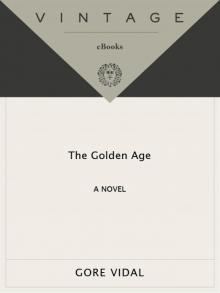 The Golden Age: A Novel
The Golden Age: A Novel Death Before Bedtime
Death Before Bedtime Burr
Burr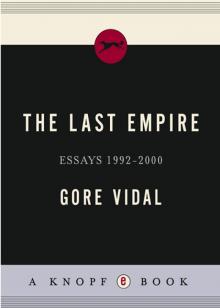 The Last Empire
The Last Empire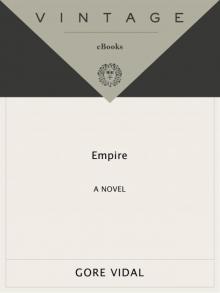 Empire: A Novel
Empire: A Novel The Selected Essays of Gore Vidal
The Selected Essays of Gore Vidal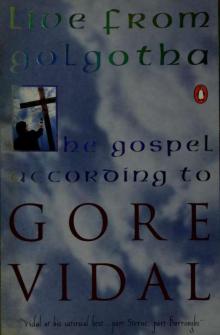 Live From Golgotha
Live From Golgotha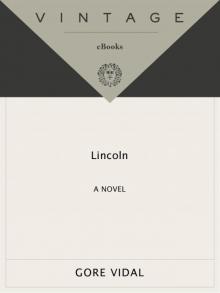 Lincoln
Lincoln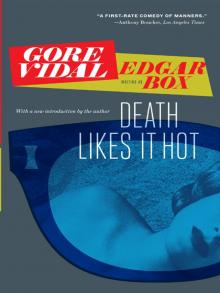 Death Likes It Hot
Death Likes It Hot Thieves Fall Out (Hard Case Crime)
Thieves Fall Out (Hard Case Crime) Point to Point Navigation
Point to Point Navigation Williwaw
Williwaw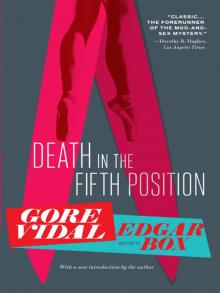 Death in the Fifth Position
Death in the Fifth Position In a Yellow Wood
In a Yellow Wood Julian
Julian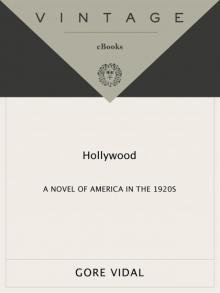 Hollywood
Hollywood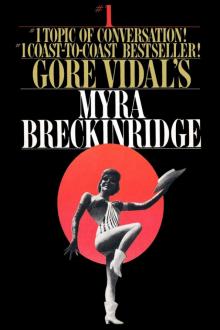 Myra Breckinridge
Myra Breckinridge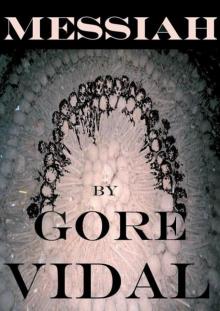 Messiah
Messiah The Second American Revolution and Other Essays 1976--1982
The Second American Revolution and Other Essays 1976--1982 Homage to Daniel Shays
Homage to Daniel Shays Empire
Empire Thieves Fall Out
Thieves Fall Out 1876
1876 The City and the Pillar
The City and the Pillar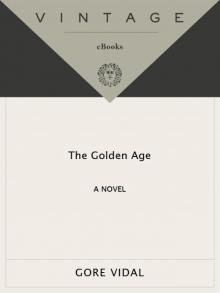 The Golden Age
The Golden Age At Home
At Home